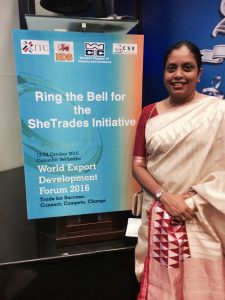Women-Owned SMEs and Trade: More than Just an Elephant in the Room
Among the conceivably infinite social and economic effects of the internet is the rise of women-owned small and medium sized enterprises (SMEs) in developing countries. For over thirty years, donor and international aid programs have invested heavily to help women in developing countries build and grow microenterprises, the business context in which the terms “woman” and “entrepreneur” have until recently been linked.

Male-owned SME rice products on display for prospective international buyers.
As a result of labor exploitation, human deprivation, illicit markets and the wealth disparities that have ensued from globalization, the global gender equality regime exists both in concert and in tension with nation-states. To overcome this, women are seeking out the knowledge and skills to develop their capabilities. As a result, more and more are starting to work for themselves.
Today’s networked communication infrastructures and online knowledge economy have given some women the opportunity to scale up their micro ventures, and others the opportunity to leapfrog past traditional stages of business maturation directly into establishing an SME. According to the World Bank, there are 8-10 million SMEs with female ownership in emerging markets, which represent 30-37% of all SMEs in these economies. Yet, as scholars and practitioners contend, women entrepreneurs in developing countries continue to face a finance gap that renders their ability to grow business and compete with male peers futile. In the eyes of many, finance is the elephant in the room.

Lakmini Wijesundera, 2016 Sri Lanka Woman Entrepreneur of the Year
At this year’s World Export Development Forum (WEDF) in Colombo, Sri Lanka, the subject of SMEs in developing countries was the central unit of analysis. Co-hosted by the International Trade Centre (ITC) and the Sri Lankan Export Development Board (EDB), plenaries and workshops alike pointed to the importance of SMEs understanding and being responsive to international quality, safety and efficiency standards, and value chain requirements.
However, this year the WTO predicts that trade will grow at its slowest pace since the 2008 recession. In his remarks at WEDF, Vice Minister Wang Shouwen of the Ministry of Commerce in China reverberated outcomes from this year’s G20 Summit, stating that developing countries must enter and move well through global value chains. While moving well can be enabled by finance, other behavioral and capability variables also influence SME performance, quality and success rates. Thus there is more than just one elephant in the room for developing country SMEs seeking to connect with global markets, even more so for those that are women-owned given the effects of what Espíritu-Olmos & Sastre-Castillo (2012) call gender socialization.

With Hon. Sujeewa Senasinghe, Sri Lanka State Minister of International Trade at the Colombo Stock Exchange and the Women’s Chamber of Industry and Commerce
On the morning of 13 October 2016, the Sri Lanka Stock Exchange opened the market by ringing the bell for SheTrades, an ITC initiative and online platform where women-owned businesses can share their profiles with buyers, and buyers can match themselves with companies that meet their sourcing requirements. The concept seizes the full potential of the internet to link suppliers with buyers who may not otherwise meet or be aware of one another.
However, the internet as a business broker raises important questions about how this interaction affects notions of healthy competition in procurement, shortlisting, vetting, managing uncertainty and the overall dynamics of the business relationship. For researchers, the depth and dimensions of such exchanges are less observable online when compared to B2B meetings held in-person, or the “old fashioned way”. ITC also hosts an annual Women Vendors Exhibition and Forum (WVEF) where women-owned SMEs can meet prospective international buyers in-person for an opportunity to generate business and grow into new markets.
For empirical research, following the relational dimensions and interaction from the point of initial contact to the finalization of a contract (or not), is a requirement for the nuanced study of process, and not only outcomes, resulting from recent initiatives designed to connect women-owned SMEs with global markets. My doctoral dissertation sets out to do just this.

With Biyagama Export Processing Zone Director Athula Jayasinghe and WEDF Delegates
On a tour of Biyagama, one of Sri Lanka’s 12 Export Processing Zones, I observed a vast mélange of services and facilities provided to international companies operating within such demarcated economic zones. Among the few women business owners attending WEDF this year, the majority indicated to me that they do not brand their businesses as women-owned. In the context of export processing zones and other trade structures globally, I began thinking about how this non-branding affects their access to often necessary social protection amenities. Like government entities, majors firms and multinational corporations seeking to source from women-owned businesses are more than just buyers. To do their jobs thoroughly and responsibly as corporate citizens, they must also measure their business performance as capacity builders.
Lastly, at WEDF strong emphasis was placed on bringing SMEs into the e-commerce highway. A trade phenomenon with its vast implications for developing economies, e-commerce has enhanced the complexity of buyer/seller relationships between the Global South/South and the Global North/South. When combining the work required to access financial capital, compliance with environmental mandates, ISO standards, country-specific import requirements and buyer-specific requirements, export-oriented SME owners have their hands full. Add to this the relevant dimensions of gender socialization and appropriation female SME owners often encounter, women simply contend with more. To that end, current and trending barriers for breaking into (and competing) in the global market require us to consider the whole room, not just the elephant, in order for each sector to effectively do its part.
This blog post was written by USC Annenberg PhD Candidate Shabnam Shalizi during a recent trip to attend the World Export Development Forum (WEDF) in Colombo, Sri Lanka.
About the Author
Shabnam Shalizi is a current PhD Candidate at the University of Southern California. A veteran of the humanitarian and international development field, she received her earlier graduate education from the London School of Economics and Georgetown University. A native of Afghanistan, Shabnam has a deep understanding of development and the policies which seek to mobilize the lives and dignity of the millions subject to extreme poverty and inaccessible markets. She has worked extensively globally, conducting empirical research, fieldwork and analysis in over 15 countries. She has advised and worked closely with officials across many private and public sector organizations, including the World Bank, United Nations and USAID. Shabnam’s research and work are at the intersection of social impact, corporate citizenship, aid effectiveness and women’s economic empowerment. A former management consultant with Deloitte and Booz Allen Hamilton, she brings to bear her background leading the delivery of large-scale humanitarian transformations.
For more information, please visit her ARNIC profile page.